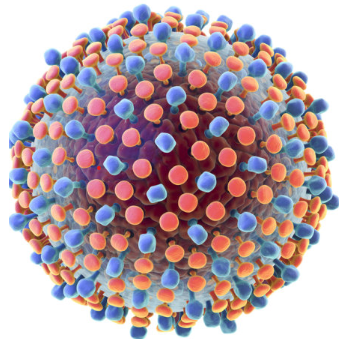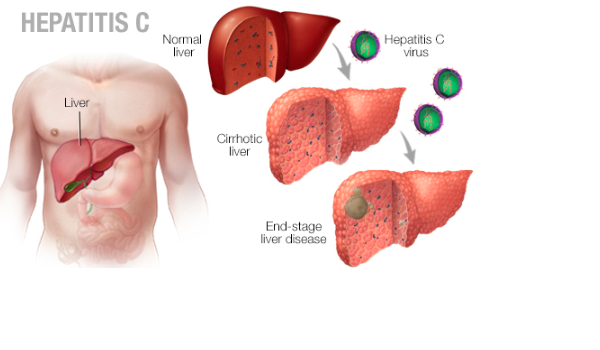Hepatitis C is a viral infection that causes liver inflammation, sometimes leading to serious liver damage. The hepatitis C virus (HCV) spreads through contaminated blood. But it causes few symptoms, so most of them don’t know. The virus spreads through an infected person’s blood or body fluids.
Until recently, hepatitis C treatment required weekly injections and oral medications that many HCV infected people couldn’t take because of other health problems or unacceptable side effects. That’s changing. Today, chronic HCV is usually curable with oral medications taken every day for two to six months.
Stages of Hepatitis C
The hepatitis C virus affects people in different ways and has several stages:
Incubation period: This is the time between first exposure to the start of the disease. It can last anywhere from 14 to 80 days, but the average is 45.
Acute hepatitis C: This is a short-term illness that lasts for the first 6 months after the virus enters your body. After that, some people who have it will get rid of, or clear, the virus on their own.
Chronic hepatitis C: If your body doesn’t clear the virus on its own after 6 months, it becomes a long-term infection. This can lead to serious health problems like liver cancer or cirrhosis.
Cirrhosis: This disease leads to inflammation that, over time, replaces your healthy liver cells with scar tissue. It usually takes about 20 to 30 years for this to happen, though it can be faster if you drink alcohol or have HIV.
Liver cancer. Cirrhosis makes liver cancer more likely. Your doctor will make sure you get regular screenings because there are usually no symptoms in the early stages.
Symptoms of Hepatitis C

Long-term infection with the hepatitis C virus is known as chronic hepatitis C. Chronic hepatitis C is usually a “silent” infection for many years, until the virus damages the liver enough to cause the signs and symptoms of liver disease.
Signs and symptoms include:
- Bleeding easily
- Bruising easily
- Fatigue
- Poor appetite
- Yellow discoloration of the skin and eyes (jaundice)
- Dark-colored urine
- Itchy skin
- Fluid buildup in your abdomen (ascites)
- Swelling in your legs
- Weight loss
- Confusion, drowsiness and slurred speech.
- Spider like blood vessels on your skin.
Causes and risk factors
The HCV virus causes hepatitis C. People contract the virus through blood-to-blood contact with contaminated blood. For transmission to occur, blood containing HCV must enter the body of a person without HCV. A speck of blood, invisible to the naked eye, can carry hundreds of hepatitis C virus particles. The virus is not easy to kill.
The one of the ways to avoid spread is cleaning syringes if it is not possible to use clean and sterile ones. Although bleach might kill the HCV in syringes, it may not have the same effect on other equipment. Boiling, burning, and using alcohol, peroxide, or other common cleaning fluids to wash equipment may reduce the amount of HCV, but it might not stop a person contracting the infection.
It is extremely dangerous to inject bleach, disinfectant, or other cleaning products, so be sure to rinse the syringe thoroughly. Only ever use bleach to clean equipment if new, sterile syringes and equipment are not available.
A person cannot contract the virus from casual contact, breathing, kissing, or sharing food. There is no evidence that mosquito bites can transfer the virus. Following are the risk factors for developing hepatitis C;
- using or having used injectable drugs, which is currently the most common cause
- receiving transfusions or organ transplants before 1992, which is before blood screening became available
- exposure to a needle stick, which is most common in people who work in healthcare
- being born to a mother who has hepatitis C
Though the risk is low, people can also contract hepatitis C through:
- sexual contact without barrier protection, especially rough or anal sex, which makes blood-to-blood contact more likely
- sharing items that could have contact with blood, such as toothbrushes or razors
- invasive healthcare procedures, such as injections
- unregulated tattooing
People who are at risk due to these factors can receive a screening to rule out HCV.
Hepatitis C Testing and Diagnosis
Doctors will start by checking your blood for:
Anti-HCV antibodies: These are proteins your body makes when it finds the hep C virus in your blood. They usually show up about 12 weeks after infection.
- It usually takes a few days to a week to get results, though a rapid test is available in some places.
- The results can be:
- Nonreactive, or negative:
- That may mean you don’t have hep C.
- If you’ve been exposed in the last 6 months, you’ll need to be retested.
- Reactive, or positive:
- That means you have hep C antibodies and you’ve been infected at some point.
- You’ll need another test to make sure.
If your antibody test is positive, you’ll get this test:
HCV RNA: It measures the number of viral RNA (genetic material from the hepatitis virus) particles in your blood. They usually show up 1-2 weeks after you’re infected.
- The results can be:
- Negative: You don’t have hep C.
- Positive: You currently have hep C.
As part of the diagnosis process, you might also get:
Liver function tests: They measure proteins and enzyme levels, which usually rise 7 to 8 weeks after you’re infected. As your liver gets damaged, enzymes leak into your bloodstream. But you can have normal enzyme levels and still have hepatitis C.
Treatment
Modern treatments can cure hepatitis C in most cases. These treatments involve a combination of antiviral medications taken for 8 to 24 weeks.
Direct-acting antiviral medicines (DAAs) can cure most cases of chronic hepatitis C and acute hepatitis C. These are modern medicines approved in 2013. The medications are well-tolerated, with the most common side effects being a headache and fatigue.
These medications work by targeting specific steps in the HCV life cycle to disrupt the reproduction of viral cells.
DAAs to treat hepatitis C include:
- elbasvir/grazoprevir (Zepatier)
- glecaprevir and pibrentasvir (Mavyret)
- ledipasvir/sofosbuvir(Harvoni)
- peginterferon alfa-2a (Pegasys)
- sofosbuvir (Sovaldi)
The choice of medication and duration of treatment depends on the genotype of the virus. Before DAAs became available, the treatment for chronic hepatitis C was lengthy and uncomfortable, with less than ideal cure rates. As per our doctors advice we can take medication, now the best HCV medicine is Epclusa (Sofosbuvir and Velpatasvir), and the generic version is MyHep All(Sofosbuvir 400mg and Velpatasvir 100mg ), Velpanat, etc.
We get these medicines easily from online pharmacy because they provide the medicines at reasonable price. The Indian pharmacies like GDMeds, Apollo, 1 mg, 984degree, these pharmacy provide quality medicine at discount rate. GDMeds pharmacy provide coupon code for MyHep All(Sofosbuvir 400mg and Velpatasvir 100mg ), we can check on their site and communicate with customer care executives for the coupon codes, they also provide discounts on other medicine like oncology.
However, new medications can be very costly. Most government and private health insurance prescription drug plans will help provide some coverage for these medications. Some drug companies and other programs can help, too.
Speak with a healthcare professional for advice on paying for hepatitis C treatment.
It is important to note that a person can get hepatitis C more than once. After successful treatment, the person should take steps to prevent another infection.





